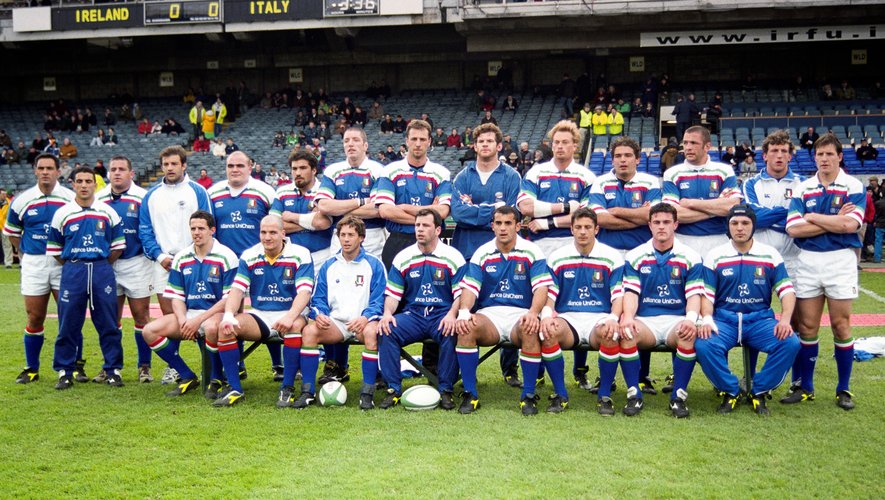
200 Years of Rugby – 2000, Italy enters the Six Nations Championship
On February 5, 2000, Italy made a sensational appearance in the Six Nations, and were no longer five. But the promises quickly disappeared. The team, which was welcomed with joy, was greatly disappointed.
The tournament moves very little and very rarely. Every 90 years… This is the period between the entry of the last two invited countries: France in 1910 and Italy in 2000. On February 5, 2000, the Alps made a successful entry to great fanfare. They outscored Scotland 34-20 and appeared to be ushering in a new era of venerable competition. Substitute prop Giampiero De Carli scored the first try in his country’s history at the tournament. Special correspondents described Roma as under the influence of the novelty of this fraternal atmosphere less divisive than that of football. For two months, the Italian players were thinking only about that. Every week since their New Zealand coach, Brad Johnston, took over, they have gathered at Tirrenia, the Olympic preparation centre. “Entering the tournament, Troncon warned, It is the dream of our generation. “On Saturday, we will be emotional, proud and victorious.”
The Italians had been waiting for this moment for twenty years, from the first calls, and over time, with the support of France, a historical partner, who was not happy to find an ally to act as a counterweight to the four Anglo-Saxon countries. The first applications were flatly rejected until the historic vote on 16 January 1998 when the committee finally took the decision to move from five nations to six nations, a decision that was taken unanimously. For the first time since 1909, all teams can play in the tournament on the same weekend. Moreover, Italy represented an economic promise: great media, great partners.
We have felt this development coming for several years, starting in the 1990s, and the Azzurri were gaining momentum. The French public discovered them in Grenoble on 22 March 1997 when they beat a French XV to everyone’s surprise by a score of 40 to 32. But the Italians of that era were not limited to this feat. Last January 4th, they beat Ireland in Ireland, having already done so in 1995, and they would do so again the following December 20th. They also beat Scotland in January 1998 in Treviso, a success which of course influenced the historic vote. Argentina also lost three times in 1978, 1995 and 1998.
In the spring of 1997, the Italians liked to say that they would have achieved three wins had they played in that year’s Six Nations, at the same level as England. All signs were green for finally ratifying the big decision which should, in principle, give a terrible boost to this rugby which we have only known from time to time. We knew that he imported foreign, often French, coaches, including Pierre Vilbriot, Bertrand Fourcade and Julien Saby, a true pioneer of the 1930s. Furthermore, the coach of the 1997 improvement was also a Frenchman, Georges Coste, from Perpignan. . It was difficult to get an idea of where rugby would find itself in a country more dedicated to football than France in terms of superiority over other sports. in launchspecial correspondent Philippe Rochette analyzes rugby’s identity in relation to football’s almost aggressive presence.
Giving joy and hope to people
So, playing rugby here means wanting to stand out, to stand out through a huge group identity. The stronghold is located in Veneto Treviso, Padua, Rovigo, a hardworking and quiet area where the big football teams are absent. Genealogies have been created of the players who represent the living flesh of Italian rugby. The clubs then proselytize among young people in other sports. In this way, Italian rugby lives with 23,000 members. But anyway, Scotland doesn’t have more. We also heard from here and there that this sport in Italy is only of interest to people from the wealthy classes.
Enthusiastic journalist, Francesco Volpi, from Corriere dello Sport explained: “You have to have sportsmanship. It’s a tough, complicated game and it doesn’t come easy. Above all, you have to know how to accept a loss. In rugby, the best lose and gain strength from their defeats. Italy, we don’t do that.” I don’t know how to lose.” A statement we can modify when we know what followed. Moreover, when Italy found out about the tournament, the atmosphere was already depressing, because the 1999 World Cup had already been a disappointment. “We cannot argue against calcio, said Massimo Giovanelli, third grade from Narbonne. There is a small rugby audience and they were disappointed by our disastrous performance in the World Cup. Above all, we must give him joy and hope.”

“Proud explorer. Freelance social media expert. Problem solver. Gamer. Extreme travel aficionado.”
